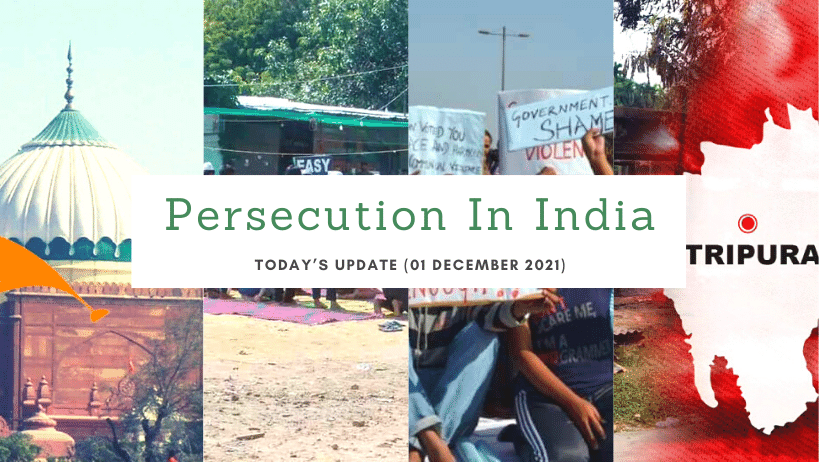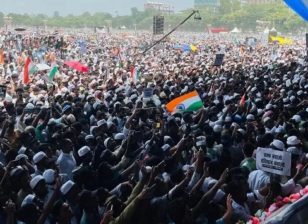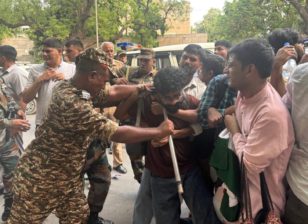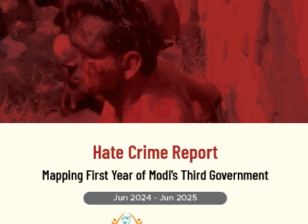Petition For Special Investigation Into Tripura Violence Lists Atrocities Against Muslims
A public lawsuit was filed at India’s Supreme Court on November 29 seeking an independent inquiry into the two-week anti-Muslim violence in Tripura state in October. The Court sent notices to Prime Minister Narendra Modi as well as to the Tripura government seeking their response.
The Tripura government has denied that any violence occurred against Muslims, their properties and places of worship. The federal government has supported that claim, which flies against overwhelming evidence as collected by independent civil society investigations.
The lawsuit at the Supreme Court said 12 mosques, nine Muslim-owned shops, and three Muslim-owned houses were vandalised in the violence.
Arguing for the petition, veteran lawyer Prashant Bhushan told the court that Tripura’s law enforcement agencies had acted in league with Hindu extremists that carried out the attacks, allowing the violence to escalate rather than step in to protect the victims. Afterward, police blamed many, including lawyers, for “promoting enmity between religious groups” through social media posts, “as well as provoking people of different religious communities to commit breach of peace.”
“Police and State authorities instead of attempting to stop the violence kept on claiming that there was no communal tension anywhere in Tripura and further denied reports of any mosque being set ablaze,” the lawsuit said. It was a “shocking state of affairs where Muslims are openly targeted by rioters and no protection has been extended to them by the Respondents and no arrests of said rioters has been made by the police authorities.”
Tripura authorities have taken draconian measures to prevent the account of the victims from being heard. Last month, two lawyers were booked under the UAPA after traveling to Tripura as part of a fact-finding team regarding the violence. Two journalists were also arrested for visiting burned mosques and speaking with victims, though they have since been granted bail after outrage.
Hindu Extremists Force Christian Family To Exhume Dead Body From Grave
Hindu extremists forced a Christian family to exhume the body of a relative in Chhattisgarh state, it was reported on November 30. Laxman Markam, 25, had died of malaria and was buried just two days before the extremist attack. The mob falsely claimed the grave was dug on “disputed land,” and demanded that the body be taken 15 miles away for reburial.
According to the Christian Post, “Laxman Markam’s corpse lay exhumed on the land for hours before police arrived. The officers then ordered the Christians to dig up the same grave, which had been filled with mud, and re-bury the body.”
The mob told the Christian family they could take the corpse “wherever they wanted” but cannot bury it in the village, pastor Samson Baghel said.
Anti-Christian attacks have worsened in rural areas, where Hindu extremist groups often work to turn Hindu villagers against Christians and Muslims. Many attacks stem from the false claim that Christians are responsible for forcibly converting Hindus. An investigation conducted by the New Indian Express, an Indian newspaper, found that claims of forced conversions in Karnataka state were unfounded. Of the more than 40 Christian families interviewed, the investigation found that all had converted of their free will.
Despite this, anti-conversion laws are regularly used to justify harassment and violence against Christians and Muslims. In Karnataka, where an anti-conversion law is in discussion, Christians have begun to avoid prayer meets for fear of being attacked. In Madhya Pradesh, one pastor and three congregants have remained in jail for 109 days. They were attacked in their own church and then arrested on false claims of forced conversions.
Anti-conversions laws have been enacted in several states, including Odisha, Madhya Pradesh, Arunachal Pradesh, Chhattisgarh, Gujarat, Jharkhand, Himachal Pradesh, Uttar Pradesh, and Uttarakhand.
Hindu Extremists Force Muslim Prayer Sites To Drop From 100 To 20 in Gurugram
The number of Muslim prayer spaces in Gurugram, a city adjacent to India’s capital, New Delhi, has dropped from 100 to 20 in three years as a result of Hindu extremist threat of violence, according to a report in scroll.in, a news website.
Rather than uphold India’s secular commitment to freedom of religion, the government in the state of Haryana, where Gurugram is located,has told the city’s Muslims to give up their prayer spaces to appease Hindu extremists. Groups of extremists protest namaz gatherings every Friday, which is a holy day for Muslims. Worshippers are harrassed, accused of using prayers as an excuse to commit crimes, and falsely labeled as “Rohingya refugees.”
Hindu extremist groups have declared that they will continue to protest the prayers until they stop completely.
According to Rajiv Mittal, a member of the extremist groups, “All this was illegal to begin with. Eventually, no Muslim will offer prayers in public in Gurugram.




